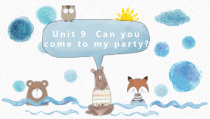 PPT
PPT
【文档说明】Unit9SectionAGrammarFocus-3c课件2022-2023学年人教版八年级上学期英语.pptx,共(22)页,1.676 MB,由小喜鸽上传
转载请保留链接:https://www.ichengzhen.cn/view-159882.html
以下为本文档部分文字说明:
Unit9Canyoucometomyparty?Review1.为考试而做准备2.看医生3.上钢琴课4.帮助我的父母亲5.拜访我的姑姑prepareforanexamgotothedoctorhaveapianolessonhelpm
yparentsvisitmyauntGrammarFocusCanyoucometomypartyonSaturday?Sure,I’dloveto.Sorry,Imuststudyforamathtest.Can
yougotothemoviestomorrownight?Sure.Thatsoundsgreat.I’mafraidnot.Ihavetheflu.Canhegototheparty?No,heca
n’t.Hehastohelphisparents.Canshegotothebaseballgame?No.she’snotavailable.Shemustgotothedoctor.Cantheygo
tothemovies?No,they’renotfree.Theymighthavetomeettheirfriends.情态动词can的用法can是一个常见的情态动词,表示说话人的语气或情态,基本意思是“能;会”。它没有人称和数的变化,在句子中
不能单独作谓语,其后必须跟实义动词原形。can的否定形式为cannot/can't/cannot;过去式为could,其过去否定形式为couldnot/couldn't。情态动词can有以下常见用法:1.表示能力情态动词ca
n一般指体力、知识、技能等方面的能力,即“能够;会”。我哥哥会游泳,但是我不会。MybrothercanswimbutIcan't.2.表示许可多用在口语中,表示请求或允许,意为“可以;能够”等。用于疑问句中用来提出要求,用于否定句中表示不允许。我可以用你的钢笔吗?CanIuseyourpe
n?3.表示推测情态动词can表示推测时,常用于否定句或疑问句,意为“(不)可能”。用于肯定句中表示理论上的可能性,意为“有时会”。这里的春天有时可能会非常冷。Itcanbeverycoldhereinspring.4.表示邀请情态动词can除了表示能力、许可或猜测之
外,还可以表示邀请;could较can更礼貌、委婉。情态动词can表示邀请时的用法如下:(1)当用情态动词can发出邀请时,用一般疑问句Can+主语+动词原形+其他?你能来参加我的聚会吗?Canyoucometomyparty?(2)当
用情态动词can发出邀请时,其回答分为两类。一类表示接受邀请,另一类表示拒绝邀请。Sure,I'dloveto.当然,我很乐意。Sure,Ithinkhe/she/theywill.当然,我想他/她/他们会的。Sor
ry.I'mnotavailable.对不起,我没有空。I'dloveto,butI'mafraidIcan't.情态动词有:may/might,can/could,must,haveto,shall/s
hould,will/would,oughtto,need,dare,usedto•1.不能独立作谓语,只能和动词原形一起构成谓语,表示•说话人的语气和情态。2.没有人称和数的变化。(haveto除外)3
.否定形式:在其之后加not(haveto除外)。疑问形式:情态动词提到主语之前(haveto除外)。Howtoacceptaninvitation.•Yes,I’dlove/liketo.•Certainl
y,I’dlove/liketo.•Sure,I’dlove/liketo.•Thanksforyourinvitation.•Thanksforaskingme.Howtodeclineaninvitation.•I’msorry,Ican’t.Ihaveto…•I’dloveto,bu
tIhaveto…•Sorry,Ican’t.I’mgoingto...•Thanksforyourinvitation.•Thankyouforaskingme.3aCompletetheanswerswithmightandoneofthephrasesinthebox
.watchTVontheweekendmycousinvisitgrandparentspracticetheviolin1.A:WhatareyougoingtodoonSaturday?B:I’mnotsure.Imight_____________________2.A:Whata
reyouplanningtodoafterschool?B:Idon’tknow._________________practicetheviolin.ImightwatchTV.3.A:Whenwillyoufinishthesciencehomework?B
:____________________________________4.A:Whoareyougoingtothemovieswith?B:__________________________________
__5.A:AreyoufreetocometomyplaceonSaturday?B:____________________________________Imightfinishitontheweekend.Imightgowithmycousin.No.Im
ightvisitgrandparents.3bCompletethesentencesbelow.Usethewordsinbracketstohelpyou.1.Inviting:_________________
_______(can/playtennis)Accepting:___________________________________2.Inviting:____________________________________(w
ouldliketo/gotothemovies)Refusing:___________________________________Reason:_____________________________(mighthaveto)Canyoucometopl
aytennis?Sure,thatsoundsgreat.Wouldyouliketogotothemovies?I’mafraidnot.Imighthavetodomyhomework.3.Inviting:_____________________
___________(can/hangoutwithustonight)Refusing:_____________________________Reason:__________________________________(mu
st)4.Inviting:________________________________(wouldliketo/cometomybirthdayparty)Accepting:______________________________Canyouhangout
withustonight?Wouldyouliketocometomybirthdayparty?No,Ican’t.Sure,I’dloveto.Imustpracticetheviolintonight.3cWritedown
everythingyouhavetodonextweek.Chooseadayandtimetohaveaparty.Theninviteclassmatestoyourparty.A:Canyoucometomyparty?B
:Whenisit?A:Nextweek,onThursdaynight.B:I’msorry.Ihavetostudyforamathtest.MON.TUE.WED.THUR.FRI.SAT.SUN.MondayTuesdayWednesdayThursdayFridaySatur
daySunday一、选择正确的词•Thankyoufor(ask/asking),butIcan’tgotothemovieswithyou.•Paulhastostudy(at/for)themathtesttonight.•
Mysisterhastoo(much/many)homeworktodo.askingformuchExercise4.Canyoucometomyparty(at/on)Saturdaynight?5.Sheinvitesme(watch/to
watch)thebasketballmatchthedayaftertomorrow.6.Ilikeplaying(piano/thepiano).ontowatchthepiano二、选择题1.CanyouplaytenniswithonSaturday?A.usB.weC.
ourD.ours2.Henryhishomeworkthisafternoon.A.havetodoB.havetodoingC.hastodoD.hastodoing3.Tonyisplayingtennistheschoolteam.A.onB.inC.toD.wit
h4.Jimplaysoccerwithhisfriendthisweekend,becauseheisverybusy.A.canB.cansC.cann’tD.can’tACBD
 辽公网安备 21102102000191号
辽公网安备 21102102000191号
 营业执照
营业执照